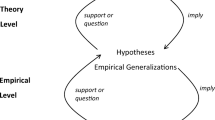Abstract
This paper synthesizes confirmation by instances and confirmation by successful predictions, and thereby the Hempelian and the hypothetico-deductive traditions in confirmation theory. The merger of these two approaches is subsequently extended to the piecemeal confirmation of entire theories. It is then argued that this synthetic account makes a useful contribution from both a historical and a systematic perspective.
Similar content being viewed by others
Notes
References
Borsboom, D., & Haig, B. D. (2013). How to practise Bayesian statistics outside the Bayesian church: What philosophy for Bayesian statistical modeling? British Journal of Mathematical and Statistical Psychology, 66, 39–44.
Carnap, R. (1950). The logical foundations of probability. Chicago: The University of Chicago Press.
Dietrich, F., & Moretti, L. (2005). On Coherent Sets and the Transmission of Confirmation. Philosophy of Science, 72, 403–424.
Fitelson, B., & Hawthorne, J. (2010). How Bayesian confirmation theory handles the paradox of the ravens. In E. Eells, & J. Fetzer (Eds.) The place of probability in science (pp. 247–275). New York: Springer.
Gelman, A., & Shalizi, C. (2012). Philosophy and the practice of Bayesian statistics in the social sciences. In H. Kincaid (Ed.) Oxford handbook of the philosophy of the social sciences (pp. 259–273). Oxford: Oxford University Press.
Gelman, A., & Shalizi, C. (2013). Philosophy and the practice of Bayesian statistics (with discussion). British Journal of Mathematical and Statistical Psychology, 66, 8–18.
Gemes, K. (1993). Hypothetico-deductivism, content and the natural axiomatisation of theories. Philosophy of Science, 60, 477–487.
Gemes, K. (1997). A new theory of content II: Model theory and some alternatives. Journal of Philosophical Logic, 26, 449–476.
Gemes, K. (1998). Hypothetico-deductivism: The current state of play. Erkenntnis, 49, 1–20.
Gemes, K. (2006). Content and Watkins’ account of natural axiomatizations. Dialectica, 60, 85–92.
Glymour, C. (1980a). Theory and evidence. Princeton: Princeton University Press.
Glymour, C. (1980b). Discussion: hypothetico-deductivism is hopeless. Philosophy of Science, 47, 322–325.
Hempel, C. G. (1943). A purely syntactical definition of confirmation. Journal of Symbolic Logic, 8, 122–143.
Hempel, C. G. (1945/65). Studies in the logic of confirmation. In Aspects of scientific explanation, (pp. 3-46). New York: The Free Press. Reprint from Mind 54, 1945.
Huber, F. (2008). Hempel’s logic of confirmation. Philosophical Studies, 139, 181–189.
Kuipers, T. (2000). From instrumentalism to constructive realism. Dordrecht: Kluwer.
Mayo, D. G. (1996). Error and the growth of experimental knowledge. Chicago and London: The University of Chicago Press.
Nicod, J. (1925). Le problème logique de l’induction. Paris: Alcan.
Popper, K. R. (1934/71). Logik der Forschung, 3rd edn. Tübingen: Mohr.
Schurz, G. (1991). Relevant deduction. Erkenntnis, 35, 391-437.
Schurz, G. (2005). Bayesian H-D confirmation and structuralistic truthlikeness: Discussion and comparison with the relevant-element and the content-part approach. In R. Festa (Ed.) Logics of scientific discovery. Essays in debate with Theo Kuipers (pp. 141–159). Amsterdam: Rodopi.
Whewell, W. (1847). Philosophy of the inductive sciences, founded upon their history, Vol. II. London: Parker.
Author information
Authors and Affiliations
Corresponding author
Rights and permissions
About this article
Cite this article
Sprenger, J. A Synthesis of Hempelian and Hypothetico-Deductive Confirmation. Erkenn 78, 727–738 (2013). https://doi.org/10.1007/s10670-013-9487-7
Received:
Accepted:
Published:
Issue Date:
DOI: https://doi.org/10.1007/s10670-013-9487-7



